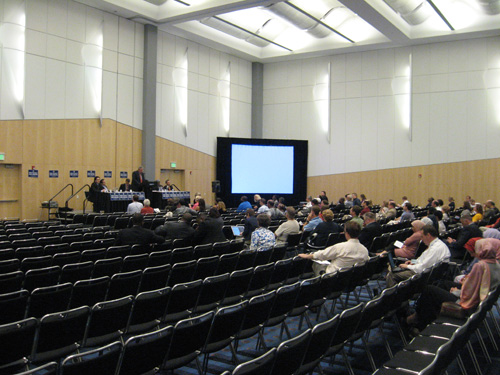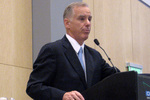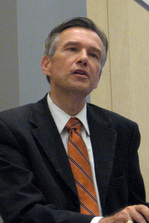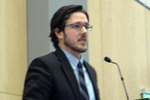
Away from the glitter and goofy hats of a political convention, you can usually catch a whiff of the things that keep Democrat insiders up at night.
In Denver on Thursday, the “faith caucus” held its first meeting ever, an attempt to bridge a divide within the party over abortion, and prepare for a Republican strategy that markets faith as a GOP virtue.
 “It’s hard for people to talk about religion,” Party Chair Howard Dean told a three-quarters-empty Denver Convention Center ballroom. “We’ve been people of faith for a long time. We just don’t like to talk about it. It matters how you live your values, not what you say on Sunday.”
“It’s hard for people to talk about religion,” Party Chair Howard Dean told a three-quarters-empty Denver Convention Center ballroom. “We’ve been people of faith for a long time. We just don’t like to talk about it. It matters how you live your values, not what you say on Sunday.”
That shot at Republicans was the easy part. When Dean left, the rift within the party over abortion was more apparent.
“I’m a pro-life Democrat and I like to think I’m in a party that has room for me,” said Rev. Dr. Barbara Williams-Skinner, former director of the Congressional Black Caucus. “Nobody should be left outside a party that’s called a Democratic Party. I’m proud to stand beside a pro-choice Democrat, but I want you to hear what I have to say. It’s saying ‘my values matter and you have room for my values that my Bible tells me about.'”
 The issue has driven millions of Catholics into the arms of the Republican Party. “The Catholic vote is an important vote,” said Dr. Douglas Kmiec of Pepperdine University, a Catholic legal scholar who wrote a Slate Magazine article claiming Obama is a natural choice for Catholics. “It’s 25% of the electorate. Catholics have voted for the winning candidate in the last nine presidential elections. They know how to pick a winner.”
The issue has driven millions of Catholics into the arms of the Republican Party. “The Catholic vote is an important vote,” said Dr. Douglas Kmiec of Pepperdine University, a Catholic legal scholar who wrote a Slate Magazine article claiming Obama is a natural choice for Catholics. “It’s 25% of the electorate. Catholics have voted for the winning candidate in the last nine presidential elections. They know how to pick a winner.”
Kmiec told a Catholic newspaper earlier this week that Barack Obama’s position on abortion is “morally unacceptable.” But he’s still voting for him. “I, too, am pro-life, but that label … has to be a commitment to all of life, from the moment of conception to the moment of death,” he said. His church responded by denying him communion.
Wooing conservative Catholics to the Democratic Party may be a tough sell. It’s no coincidence that Obama picked a Catholic — Joe Biden — as a running mate. Biden, however, supports legalized abortion in defiance of his church.
An even tougher sell for a party trying to learn how to talk religion is evangelical Christians, a solid Republican voting bloc.
 “Younger evangelicals are morally conservative but more socially compassionate than previous generations of evangelicals,” according to Cameron Strang, of Relevant Magazine. “They’re very pro-life, but this generation has a more holistic view of what it means — the defense of innocent lives. Not just the unborn, but it includes genocide, unnecessary war, slavery, and abortion.”
“Younger evangelicals are morally conservative but more socially compassionate than previous generations of evangelicals,” according to Cameron Strang, of Relevant Magazine. “They’re very pro-life, but this generation has a more holistic view of what it means — the defense of innocent lives. Not just the unborn, but it includes genocide, unnecessary war, slavery, and abortion.”
Strang identified some common ground on the issue of abortion — adoption reform. “If the Supreme Court overturns Roe v. Wade, what happens to all of these unwanted children?” he asked. “It costs $25,000 for an adoption. It costs $500 for an abortion. That’s messed up.”
But Strang this week showed why it will be difficult for Democrats to stand side-by-side with evangelicals. He was to give the benediction at the convention on Monday, but pulled out, citing fears his bridge-building gesture would be misinterpreted.
Little known to outsiders, the Strang name carries weight with evangelicals, especially in the fast-growing charismatic and Pentecostal branches, according to the Chicago Tribune.
